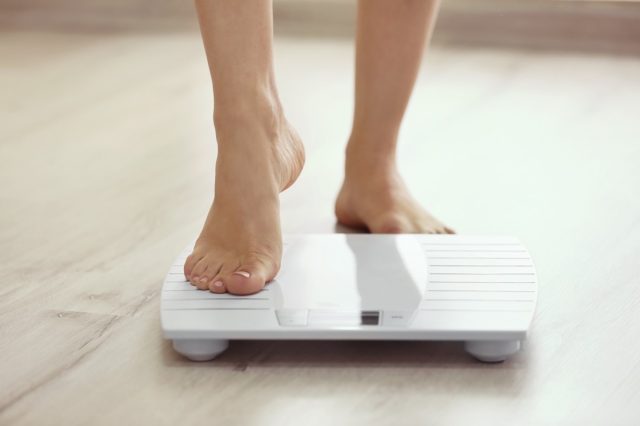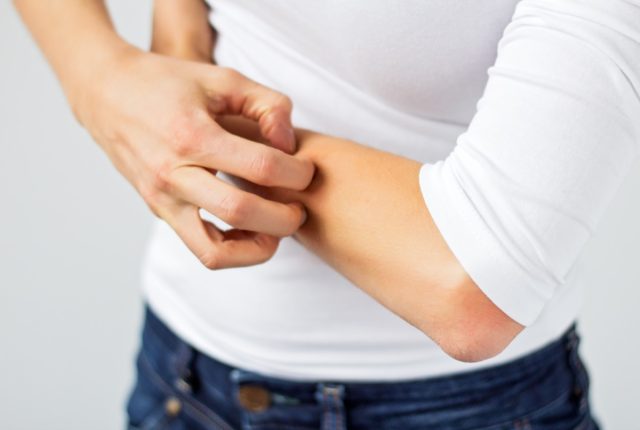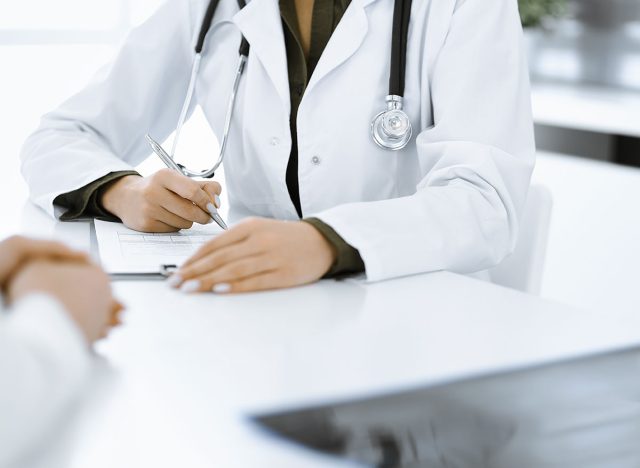Pancreatic cancer is known as the “silent killer” and for good reason: Many patients don’t experience symptoms until the cancer is advanced. Alex Trebek, Steve Jobs, Aretha Franklin, Alan Rickman, and Patrick Swayze are just some of the more high-profile victims of pancreatic cancer, which accounts for 3% of all cancers in the U.S., and approximately 7% of all cancer deaths. “Pancreatic cancer is hard to diagnose early because there’s no standard screening test for it,” says medical oncologist Maged Khalil, MD. “People experience symptoms before ever being checked for it.” Here is what pancreatic cancer feels like, according to the experts. Read on—and to ensure your health and the health of others, don’t miss these Sure Signs You’ve Already Had COVID.


It’s difficult to feel the symptoms of pancreatic cancer until the disease is advanced, but unintentional weight loss could be one of the signs. “There are no specific symptoms for early-stage pancreatic cancer, but if you notice unintentional weight loss, jaundice (yellowing of the skin) and stomach pain, we recommend that you see your primary care physician,” says surgical oncologist Jin He, M.D., Ph.D.
RELATED: Surprising Reasons You Could Get Cancer, Say Physicians


Pain in the upper abdomen that spreads around to the back is common in people with pancreatic cancer. “Almost 7 out of 10 people (70%) with pancreatic cancer go to their doctors because they have pain,” explains Cancer Research UK. “Pain is more common in cancers of the body and tail of the pancreas. People describe it as a dull pain that feels as if it is boring into you. It can begin in the stomach area and spread around to the back. The pain is worse when you lie down and is better if you sit forward. It can be worse after meals.”
RELATED: Never Do This to Lose Visceral Fat, Say Experts


Digestive issues could be a strong indicator of pancreatic cancer. “Loss of appetite, indigestion and nausea are common in people with pancreatic cancer,” explains Pancreatic Cancer Action Network. “These symptoms often happen when the disease affects a person’s ability to digest food and absorb nutrients. They may also occur when a tumor blocks or slows the regular digestive processes.”
RELATED: Never Do This When Around Your Family, Say Health Experts


“Diarrhea results when the nutrients in food are not absorbed properly,” according to the Pancreas Center at Columbia University’s Department of Surgery. “When this occurs, stool can become loose, watery, oily and foul-smelling. Pancreatic enzymes are responsible for digesting fatty foods. If a tumor blocks the pancreatic duct, insufficient pancreatic juices in the intestines can lead to poor absorption and diarrhea, as the undigested food passes quickly through the digestive tract. If this happens, stool may float due to the higher fat content, appear bulky, greasy, and unusually pale.”
RELATED: The #1 Sign Your Blood Sugar is “Way Too High”


Yellowing of the skin and eyes—known as jaundice—is strongly linked to pancreatic cancer. “The most common single symptom is jaundice, and most patients will present to their regular doctor with jaundice or to the emergency room, and they’ll be evaluated and chances are they’ll have a scan and may get a scope to help relieve the jaundice,” says Matthew Walsh, MD, chairman of the department of general surgery at Cleveland Clinic. “And that’ll give them either a clear diagnosis, because you can do a type of brush biopsy of a bile duct in someone who has jaundice, and jaundice is just blockage of the bile duct in this case that causes yellowing of the skin and eyes, and often very irritating itching.”
RELATED: Virus Experts Warn This is What May Happen Next


If you are in any way concerned about pancreatic cancer, see a health professional for guidance as soon as possible. “If you have unexplained symptoms, constant abdominal pain or weight loss, unintended weight loss, new onset problems with your glucose and insulin management, those might be symptoms for one to think about pancreas cancer,” says Dr. Curtis Wray, surgical oncologist with UT Physicians and UTHealth. “Getting in to see a primary care physician earlier is always helpful. Too many of us don’t see their physician on a regular basis, and obviously with the COVID-19 pandemic, that’s made routine medical care a lot more challenging over the last 10 months.”
RELATED: Surprising Reasons You Could Get Cancer, Say Physicians